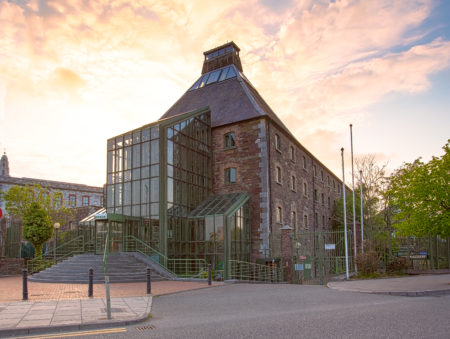29 March 2021
By Tom Collins
tom@TheCork.ie

Unusually for a multinational, Heineken has its Ireland headquarters in Cork, not Dublin. It is based in the former Murphy’s Brewery, Ladyswell, Blackpool, just North of the River Lee.
HEINEKEN Ireland has today released its 2020 sustainability progress report demonstrating the strength of the brewers’ commitment to maintaining environmental progress despite the profound challenges Covid-19 presented for the drinks and hospitality sectors in the past 12 months. The brewer has been removing plastic shrink and can connectors from across its portfolio of beers and ciders, on its mission to eliminate 4 million pieces of consumer-facing in 2021. It also recorded a cumulative 50% reduction in transport emissions.
Key 2020 highlights across the six pillars of HEINEKEN Ireland’s Brew a Better World sustainability strategy include:
Reducing CO₂ emissions – as demand shifted from pubs to retail outlets, HEINEKEN balanced lower keg deliveries with increased retail deliveries by working with customers to drive efficiencies such as direct delivery and self-collecting in 2020. This drove a reduction in transport emission down 50% over the past decade. Total energy usage in 2020 also reduced considerably with gas down 33.69% and energy down 32.04% as production volumes at the brewery in Cork reduced due to the prolonged closure of the hospitality sector.
Circular waste – Building on reaching zero waste to landfill and moving towards a circular economy approach to waste, HEINEKEN Ireland repurposed over 5,000 tonnes of beer – the equivalent of 9 million pints – collected from bars during lockdown and sent it to anaerobic digestion plants creating 480kW per hour of electricity and heat which equates to the electricity supply of over 48,000 houses in 1 day*. Product from this process was also used as agricultural fertiliser.
Protecting water resources – The brewery in Cork is consistently one of the most water efficient in HEINEKEN’s global network as a result of water metering systems and continuous improvements to optimise usage. While HEINEKEN Ireland’s water reduction targets are linked to per hectolitre production volumes – which were impacted in 2020 – overall water usage is down 42%
Local sourcing – HEINEKEN Ireland’s local first aproach continued as the business committed to supporting 235 Irish suppliers in 2020 and proudly used 100% Irish barley in production. 100% of suppliers signed – and were compliant with – the principles expressed in its Supplier Code in 2020.
Responsible consumption – 17% of Heineken® media spend was used to support the re-opening of the on-trade and encouraged everyone to socialise responsibly with its ‘Back to the Bars’ #SocialiseResponsibly campaign last year. By giving consumers real choice in moderation, HEINEKEN has successfully led the growth of the low and no alcohol market with over 1,000 ‘Zero Zone’ display units, installed in retailers across Ireland.
Growing with its Communities – In 2020, HEINEKEN Ireland remained focused on its commitments to its charity partner Cork Simon, funding their Aftercare Programme and helping fund necessary PPE equipment during Covid-19. The company also answered the calls for COVID support, making its trade digital advertising screens available for safety messages; supplying Heineken 0.0 to frontline staff; and making its carparks available to local hospitals. Over €540,000 was donated to 33 charities and community groups.
Commenting on the 2020 sustainability report, Barbara-Anne Richardson, HEINEKEN Ireland’s Sustainability and Public Affairs Manager said:
“2020 marked 10 years of progress on our sustainability goals under our global Brewing a Better World strategy. Although 2020 posed unique and profound challenges for the drinks industry we are pleased to report that despite lower production levels we have achieved key targets within our control across waste, packaging and transport as well as significant reductions in water and energy use. From deploying energy reducing transport solutions to sustainably repurposing beer from pubs in lockdown to create energy and agricultural fertiliser, we never lost sight of our environmental commitments in 2020. We are proud to continue to operate as a sustainable and responsible business and as we double down on our low carbon pledge, we can and will do more to drive further sustainability improvements in the decade ahead including moving to science based targets by 2024.”
